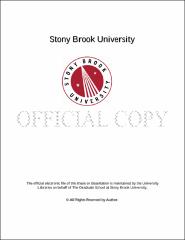| dc.identifier.uri | http://hdl.handle.net/11401/77195 | |
| dc.description.sponsorship | This work is sponsored by the Stony Brook University Graduate School in compliance with the requirements for completion of degree. | en_US |
| dc.format | Monograph | |
| dc.format.medium | Electronic Resource | en_US |
| dc.language.iso | en_US | |
| dc.publisher | The Graduate School, Stony Brook University: Stony Brook, NY. | |
| dc.type | Dissertation | |
| dcterms.abstract | Therapy and support programs for siblings of youth with autism spectrum disorders (ASD) are on the rise, indicating a growing demand for specialized sibling services. However, current research findings remain unclear as to what exactly the needs of siblings might be and why those needs might be present. The current dissertation aims to identify what particular risk factors may lead to problematic outcomes that warrant clinical services (e.g., emotional, behavioral, or social problems), while concurrently, examining resilience factors that may lead to positive functioning in these areas. A comprehensive family systems model was created drawing from literature related to relevant predictors for typically developing (TD) youth, including maternal depression and sibling relationship quality. The model also reflected literature regarding family systems affected by ASD, such parental stress and severity of ASD symptoms. A total of 239 mothers of one youth with autism (simplex families) and at least one other youth (ages 6-17) completed online standardized measures of various familial factors and TD youth outcomes. Overall, only a subset of siblings was identified as being in the clinical range in regards to emotional, behavioral, or social functioning (6%-23%). Based on the data, a good-fitting path analysis model including specific pathways that led to both problematic and adaptive outcomes for siblings was created. Both maternal depression and sibling relationship were identified as key components in predicting siblings’ functioning. Findings are discussed in terms of moving towards an evidence base for intervention and support for this unique population of children, as well as a more systematic manner of assessing which siblings may be at risk or, conversely, resilient within their family system. | |
| dcterms.abstract | Therapy and support programs for siblings of youth with autism spectrum disorders (ASD) are on the rise, indicating a growing demand for specialized sibling services. However, current research findings remain unclear as to what exactly the needs of siblings might be and why those needs might be present. The current dissertation aims to identify what particular risk factors may lead to problematic outcomes that warrant clinical services (e.g., emotional, behavioral, or social problems), while concurrently, examining resilience factors that may lead to positive functioning in these areas. A comprehensive family systems model was created drawing from literature related to relevant predictors for typically developing (TD) youth, including maternal depression and sibling relationship quality. The model also reflected literature regarding family systems affected by ASD, such parental stress and severity of ASD symptoms. A total of 239 mothers of one youth with autism (simplex families) and at least one other youth (ages 6-17) completed online standardized measures of various familial factors and TD youth outcomes. Overall, only a subset of siblings was identified as being in the clinical range in regards to emotional, behavioral, or social functioning (6%-23%). Based on the data, a good-fitting path analysis model including specific pathways that led to both problematic and adaptive outcomes for siblings was created. Both maternal depression and sibling relationship were identified as key components in predicting siblings’ functioning. Findings are discussed in terms of moving towards an evidence base for intervention and support for this unique population of children, as well as a more systematic manner of assessing which siblings may be at risk or, conversely, resilient within their family system. | |
| dcterms.available | 2017-09-20T16:52:10Z | |
| dcterms.contributor | Robinson, John | en_US |
| dcterms.contributor | Lerner, Matthew D | en_US |
| dcterms.contributor | Wolf, Julie. | en_US |
| dcterms.contributor | O'Leary, K. D. | en_US |
| dcterms.creator | Tudor, Megan Elissa | |
| dcterms.dateAccepted | 2017-09-20T16:52:10Z | |
| dcterms.dateSubmitted | 2017-09-20T16:52:10Z | |
| dcterms.description | Department of Clinical Psychology. | en_US |
| dcterms.extent | 137 pg. | en_US |
| dcterms.format | Application/PDF | en_US |
| dcterms.format | Monograph | |
| dcterms.identifier | http://hdl.handle.net/11401/77195 | |
| dcterms.issued | 2015-12-01 | |
| dcterms.language | en_US | |
| dcterms.provenance | Made available in DSpace on 2017-09-20T16:52:10Z (GMT). No. of bitstreams: 1
Tudor_grad.sunysb_0771E_12338.pdf: 3815281 bytes, checksum: c92ef2d0f924a3dd6381f3d83973244d (MD5)
Previous issue date: 1 | en |
| dcterms.publisher | The Graduate School, Stony Brook University: Stony Brook, NY. | |
| dcterms.subject | autism, family, model, siblings | |
| dcterms.subject | Psychology | |
| dcterms.title | Getting to Know Siblings of Youth with Autism Spectrum Disorder: A Model of Risk and Resilience | |
| dcterms.type | Dissertation | |

